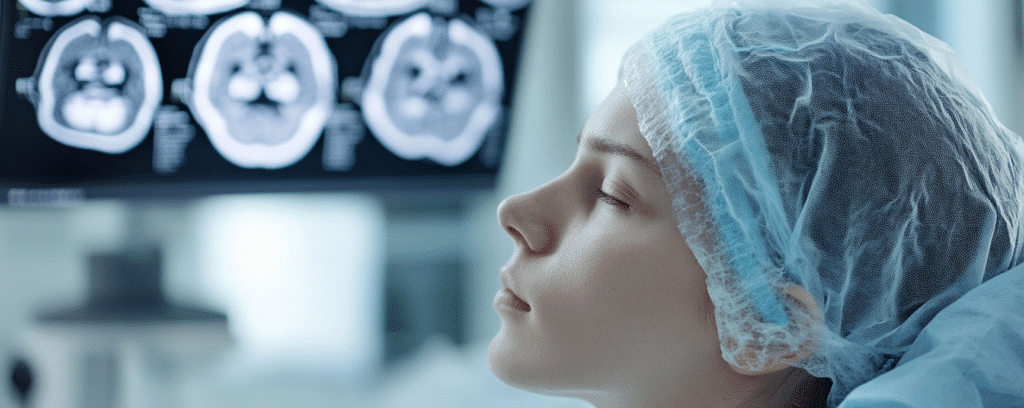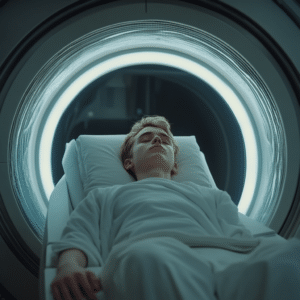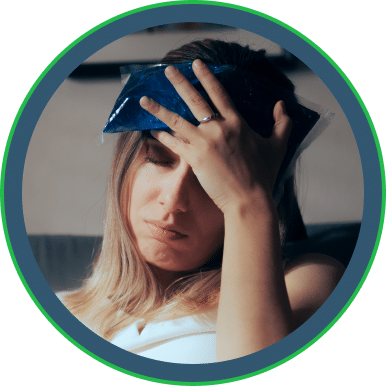
Coup contrecoup brain injuries involve brain damage at both the impact site and the opposite side due to the brain rebounding within the skull. Recognizing coup contrecoup brain injury symptoms early is crucial for effective treatment. This article will cover the main symptoms, including physical, cognitive, and emotional changes, and guide you through diagnosis, treatment, and recovery.
Key Takeaways
- Coup contrecoup brain injuries involve damage at the impact site and opposite side due to head movement, often resulting from accidents or blunt force trauma.
- Symptoms can be diverse, falling into physical (e.g., headaches, dizziness), cognitive (e.g., memory impairment, slowed thinking), and emotional categories (e.g., behavioral changes).
- Effective treatment requires a multidisciplinary approach, including physical, occupational, and speech therapy, focusing on rehabilitation tailored to the patient’s specific needs.
Your search for help ends here. Let’s get started, for FREE.
Overview of Coup Contrecoup Brain Injury
A coup contrecoup brain injury involves two distinct injuries to the brain. These injuries happen during a single incident. The “coup” injury happens at the site of impact, while the “contrecoup” injury occurs on the opposite side of the brain due to the brain rebounding within the skull. This type of injury is classified as a serious traumatic brain injury because it involves significant damage to the brain tissue and can disrupt multiple brain functions. Coup contrecoup injuries are particularly concerning due to their complexity.
These injuries are often the result of sudden and forceful movements of the head, such as those experienced during car accidents, falls, or sports-related impacts. The external forces involved, like blunt force trauma or collisions, cause the brain to collide with the skull, leading to damage at both the initial impact site and the opposite side due to rebound forces, including a head injury, head trauma, and a closed head injury.
The scenarios leading to coup contrecoup brain injuries are varied, ranging from violent assaults involving punches and kicks to everyday accidents like slipping and falling. Due to the nature of these injuries, they can affect multiple regions of the brain, causing a wide range of symptoms and complications. When a coup injury occurs, recognizing the complexity of these injuries helps in effective diagnosis, treatment, and long-term management.
Primary Symptoms of Coup Contrecoup Brain Injury
Coup contrecoup brain injuries can cause a myriad of symptoms, broadly categorized into physical, cognitive, and emotional. Each category encompasses a range of issues that can significantly impact a person’s daily life and overall well-being, including traumatic brain injuries.
The symptoms stem from the diverse regions of the brain affected by the injury. For instance, physical symptoms might include severe headaches and dizziness, while cognitive symptoms often involve memory impairment and slowed processing. Emotional and behavioral changes are also common, adding another layer of complexity to the recovery process.
Recognizing these primary symptoms helps in assessing the injury’s extent and seeking appropriate medical attention.
Physical Symptoms
 Physical symptoms are often the most immediately noticeable after a coup contrecoup brain injury. One of the most frequently reported issues is severe headaches. These headaches can be debilitating and persistent, affecting daily activities and overall quality of life.
Physical symptoms are often the most immediately noticeable after a coup contrecoup brain injury. One of the most frequently reported issues is severe headaches. These headaches can be debilitating and persistent, affecting daily activities and overall quality of life.
Dizziness is another common symptom, resulting from the disruption of signals within the vestibular system. This can lead to balance problems and a constant feeling of unsteadiness. Nausea, often linked to increased intracranial pressure or vestibular dysfunction, can also be a direct consequence of the injury.
Motor control issues are particularly challenging, as they can manifest as difficulties with coordination and balance. These symptoms can significantly impact daily routines, making simple tasks like walking or picking up objects a struggle. Targeted therapies can improve mobility and overall function when addressing these physical symptoms.
Cognitive and Memory Impairments
Cognitive and memory impairments are hallmark symptoms of coup contrecoup brain injuries. Memory impairment, including amnesia, often occurs, making it difficult for individuals to recall short-term information or events surrounding the injury. Survivors frequently experience slowed cognitive processing, impacting their ability to concentrate, solve problems, and perform other thinking skills. This can be particularly frustrating and can hinder their ability to return to work or school.
Temporal lobe damage, a common consequence of these injuries, can further complicate cognitive functions related to hearing, memory, and language comprehension. Challenges such as difficulty speaking or understanding language can emerge, significantly affecting communication and daily interactions. Specialized therapies are vital for rehabilitating cognitive impairments.
Emotional and Behavioral Changes
Emotional and behavioral changes are significant and often overlooked symptoms of coup contrecoup brain injuries. Damage to the brain’s frontal lobe can lead to profound changes in behavior and decision-making, characterized by increased impulsivity and poor judgment.
Support groups can play a vital role in the emotional and psychological recovery of patients and their families, providing a space to share experiences and coping strategies. Emotional regulation issues, caused by brain damage, can strain interpersonal relationships and affect daily functioning.
Addressing emotional and behavioral changes ensures a holistic recovery approach. It ensures that the psychological aspects of recovery are given as much attention as the physical and cognitive challenges.
Suffered a Brain Injury?
Symptoms Based on Affected Brain Regions
The symptoms of coup contrecoup brain injuries can vary widely based on the specific brain regions affected. Each part of the brain controls different functions, so the location of the injury plays a crucial role in determining the symptoms experienced.
The primary areas often involved in these injuries include the frontal, parietal, occipital, and temporal lobes. Damage to each of these regions can result in distinct symptoms, affecting everything from cognitive functions to sensory processing. Identifying region-specific symptoms aids in tailoring treatment and rehabilitation strategies.
Frontal Lobe Damage
The frontal lobe is essential for thinking, decision-making, and personality. Damage to this area can significantly affect cognitive functions, including attention, planning, and memory. Such damage can also result in marked changes in personality and behavior, often leading to increased impulsivity and poor judgment.
Physical impairments, such as weakness or paralysis of voluntary muscle movements, can also occur, further complicating the recovery process.
Parietal Lobe Damage
The parietal lobe plays a crucial role in sensory processing and spatial awareness. Damage to this area can lead to significant challenges in these functions. Symptoms may include difficulties with spatial orientation and sensory perception, making it hard for individuals to interact with their surroundings effectively.
These impairments can be particularly debilitating, affecting daily activities and overall independence.
Occipital Lobe Damage
The occipital lobe is primarily responsible for processing visual stimuli. Damage to this area can cause a range of visual disturbances. In severe cases, injury to the occipital lobe can lead to partial or complete blindness, dramatically affecting a person’s ability to navigate their environment and perform everyday tasks.
Improving quality of life involves addressing these visual impairments.
Temporal Lobe Damage
The temporal lobe is vital for auditory processing and memory retrieval. Damage to this area can result in significant difficulties with these functions. Language comprehension issues can also arise, making communication challenging. These impairments can significantly affect daily interactions and overall functionality.
Addressing these cognitive and auditory challenges requires specialized therapies.
Secondary Symptoms and Complications
Secondary symptoms and complications often arise following coup contrecoup brain injuries. Common issues include persistent headaches and dizziness, which can severely impact daily life. Seizures are another potential complication, posing significant health risks.
Additionally, individuals may experience increased sensitivity to light and sound, mood swings, and irritability due to brain damage. These long-term complications underscore the need for comprehensive and ongoing medical care.
Diagnosis and Immediate Medical Attention
 Anyone suspected of having a coup contrecoup brain injury requires immediate medical attention, even if symptoms appear to be mild traumatic brain injury or severe traumatic brain injury.
Anyone suspected of having a coup contrecoup brain injury requires immediate medical attention, even if symptoms appear to be mild traumatic brain injury or severe traumatic brain injury.
Early diagnosis can make a significant difference in outcomes. Diagnostic imaging techniques such as MRI and CT scans are commonly used to assess the extent of the injury. Neurological exams also play a critical role in evaluating brain function and identifying specific areas of damage.
In severe cases, monitoring intracranial pressure and performing surgical interventions may be necessary to manage complications and prevent further brain damage.
Regular assessments and imaging studies are essential throughout the recovery process to ensure proper healing and detect any emerging issues.
Treatment Options for Coup Contrecoup Brain Injuries
Treating coup contrecoup brain injuries requires a multidisciplinary approach involving neurosurgeons, trauma surgeons, and rehabilitation specialists. The primary goal is to maximize recovery and quality of life while minimizing long-term disabilities. Treatment methods vary depending on the specific brain regions affected and the severity of the symptoms.
Immediate emergency medical care prioritizes the stabilization of the patient. It also involves controlling bleeding and swelling while preventing further damage. Long-term treatment plans often involve rehabilitative exercises and activities tailored to the patient’s needs.
Monitoring progress and adjusting treatment strategies is a critical role of medical professionals.
Physical Therapy
For those with coup contrecoup brain injuries, physical therapy addresses movement, balance, and coordination problems, making it a crucial component of recovery. Physical therapists assess muscle strength and mobility to create personalized treatment plans that target specific impairments and promote functional independence.
Innovative tools like FitMi, which includes 40 exercises focused on the legs, core, arms, and hands, can significantly enhance recovery by providing targeted exercises and interactive games. These tools make therapy more engaging and effective, helping patients regain lost abilities and improve their overall physical health.
Occupational Therapy
Occupational therapy helps patients regain daily living skills and return to normal activities. Therapists work on improving the patient’s ability to perform daily tasks independently, which is crucial for restoring a sense of normalcy and self-sufficiency.
The focus is on helping patients return to their routines, whether it’s cooking, dressing, or other essential activities. Addressing practical aspects of daily life, occupational therapy plays a vital role in overall rehabilitation.
Speech Therapy
Speech therapy aims to improve language skills and teach communication strategies for patients with brain injuries. Therapists often develop personalized strategies to assist individuals in effective communication, which is crucial for social interactions and daily functioning.
Interactive applications can be used to provide engaging exercises that help patients practice and enhance their language abilities. These tools make therapy more accessible and effective, supporting the rehabilitation process.
Long-Term Management and Recovery
Long-term management and recovery from coup contrecoup brain injuries require a comprehensive approach involving ongoing support and education for patients and their families. Collaborating with medical and rehabilitation professionals maximizes recovery potential and enhances quality of life.
With the right support and time to heal, significant improvements in function and quality of life can occur. The long-term consequences of these injuries, such as the impact on the ability to work and participate in activities, highlight the importance of a well-rounded recovery plan.
Importance of Legal Representation
Navigating brain injury lawsuits and securing fair compensation requires effective legal representation. Attorneys can assist victims in dealing with insurance companies, who often seek to minimize payouts and help interpret complex medical evidence necessary for brain injury cases.
Having legal guidance helps victims understand their rights and the legal processes involved in pursuing claims. An experienced attorney can evaluate the long-term impacts of a brain injury, ensuring accurate damage calculations and fair compensation.
Frequently Asked Questions
What is a coup contrecoup brain injury?
A coup contrecoup brain injury involves damage to the brain at the point of impact as well as on the opposite side, caused by the brain’s movement within the skull. This dual injury highlights the complexity of traumatic brain injuries and the importance of proper diagnosis and treatment.
What are the primary symptoms of coup contrecoup brain injuries?
The primary symptoms of coup contrecoup brain injuries include headaches, dizziness, memory loss, slowed cognitive processing, and mood swings. These manifestations can significantly impact both physical and emotional well-being.
How are coup contrecoup brain injuries diagnosed?
Coup contrecoup brain injuries are diagnosed primarily through MRI and CT scans, complemented by neurological exams to evaluate brain function and pinpoint damaged areas. This comprehensive approach ensures an accurate assessment of the injury.
What treatment options are available for coup contrecoup brain injuries?
For coup contrecoup brain injuries, a multidisciplinary approach is essential, incorporating physical, occupational, and speech therapies alongside immediate emergency care to stabilize the patient. This comprehensive treatment strategy aims to optimize recovery and minimize long-term effects.
Why is legal representation important for coup contrecoup brain injury victims?
Legal representation is essential for coup contrecoup brain injury victims as it helps secure fair compensation, effectively negotiate with insurance companies, and interpret complex medical evidence. This support is vital for ensuring victims receive the justice and financial support they deserve.











